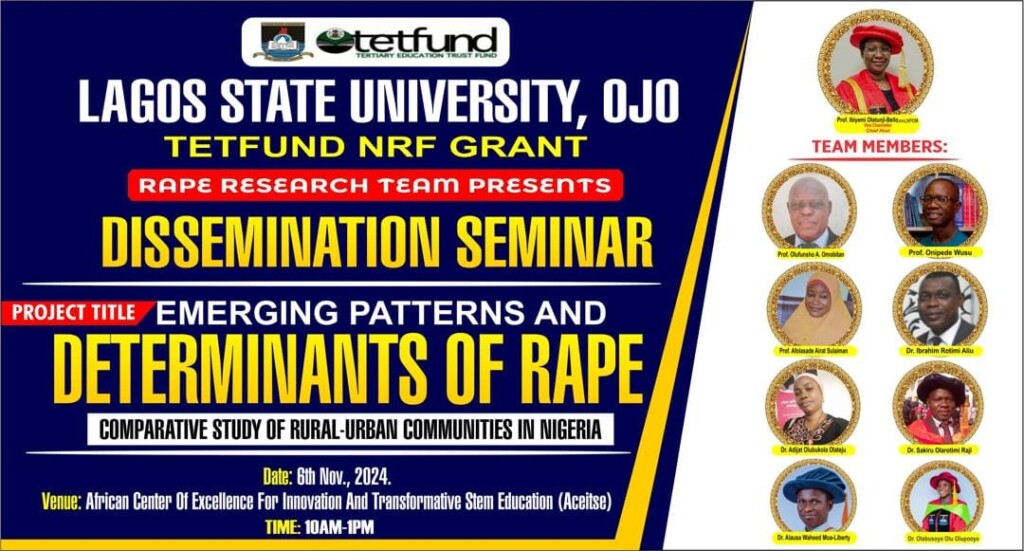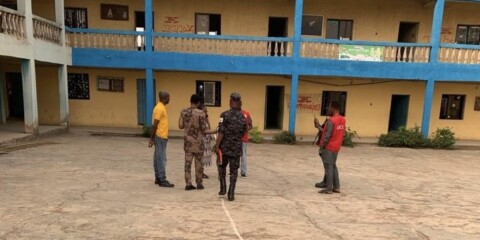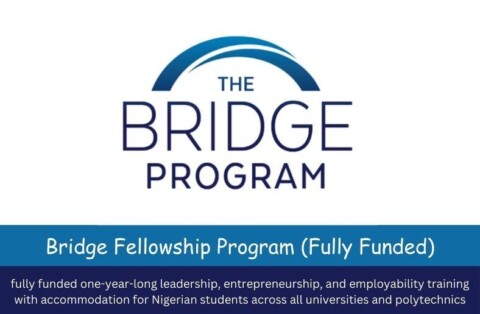The Lagos State University (LASU) team has successfully conducted a nationwide, comprehensive research on rape in Nigeria, utilizing a N34 million grant from the Tertiary Education Trust Fund (TETFUND). The groundbreaking study, which covers Nigeria’s six geopolitical zones, was presented to the public on November 6, 2024, at a dissemination seminar held at LASU’s ACEITSE Lecture Hall.
The research project, spearheaded by the university’s Deputy Vice-Chancellor of Academics, Prof. Olufunsho Omobitan, as the Principal Investigator, was a collaborative effort involving experts from various disciplines, including Economics, Sociology, Counselling, Geography, and Planning. This interdisciplinary approach reflects LASU’s growing reputation as a research hub, a vision championed by the Vice-Chancellor, Prof. Ibiyemi Olatunji-Bello.
Prof. Olatunji-Bello described the study as “unprecedented” and “the most comprehensive and profoundly empirical study on rape in Nigeria.” The project, titled Emerging Patterns and Determinants of Rape: A Comparative Study of Rural-Urban Communities in Nigeria, kicked off in April 2021, with a research team of eight scholars.
The team, led by Prof. Onipede Wusu, navigated significant challenges, including security threats, economic struggles, and a delayed TETFUND release, which forced them to limit the dissemination seminar to Lagos, instead of the originally planned two locations in Lagos and Abuja. Despite these obstacles, the team maintained their commitment to the project, which ultimately produced critical findings.
The research involved 3,023 female participants from 12 states across the six geopolitical zones, utilizing a mixed-methods approach to collect and analyze both quantitative and qualitative data. The findings revealed that rape incidents were higher in rural areas compared to urban areas. Family members and neighbors were identified as the principal perpetrators, while childhood sexual abuse, ethnicity, and broken family backgrounds emerged as key risk factors for rape.
The research uncovered that 35% of women nationwide reported experiencing childhood sexual abuse. Furthermore, 10% of currently married women and 11% of never-married women reported being victims of rape, while 15% of vulnerable adult groups were affected. The study also highlighted the prevalence of marital rape and sexual violence across various age groups, both in rural and urban areas.
To address the rising incidence of rape, the study recommended stronger child protection laws, consistent media campaigns against sexual violence, and a renewed focus on family values. These recommendations were echoed by Prof. Olatunji-Bello, who urged all stakeholders, including government agencies, lawmakers, advocacy groups, community leaders, and educators, to take the research findings seriously.
In her address, Prof. Olatunji-Bello emphasized the global importance of addressing rape as a significant public health and social issue. She called for the protection of female children and women, particularly in rural communities where they are the most vulnerable. The Vice-Chancellor reaffirmed her administration’s commitment to advancing research and innovation, further positioning LASU as a leader in academia across Africa.
A notable moment in the seminar was the unveiling of the policy brief, which outlines the key findings and recommendations of the research, intended to benefit not just the university, but also the broader state and national community.
The research team, which consisted of members from five departments within two faculties, included: Prof. Olufunsho Omobitan, Prof. Onipede Wusu, Prof. Folashade Airat, Dr. Ibrahim Rotimi Aliu, Dr. Adijat Olateju, Dr. Alausa Waheed, Dr. Busoye Olupooye, and Dr. Sakiru Raji. Their dedication to integrity and transparency, particularly in adhering to TETFUND’s financial management terms, has earned them the respect of stakeholders and highlighted the continued excellence of LASU as an institution of knowledge.
This pioneering research is a testament to the university’s role in addressing critical societal issues and shaping the future of education and research in Nigeria.





